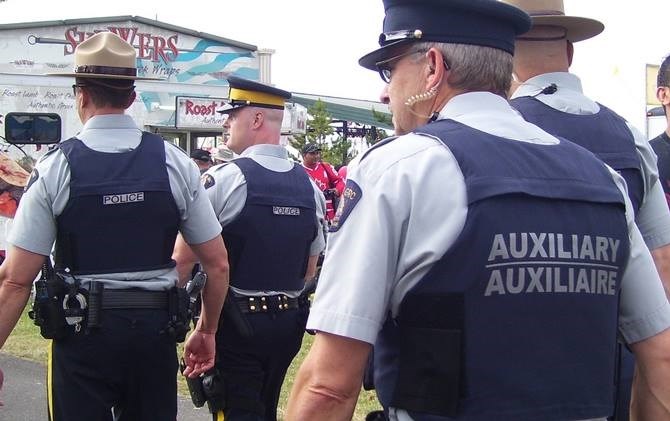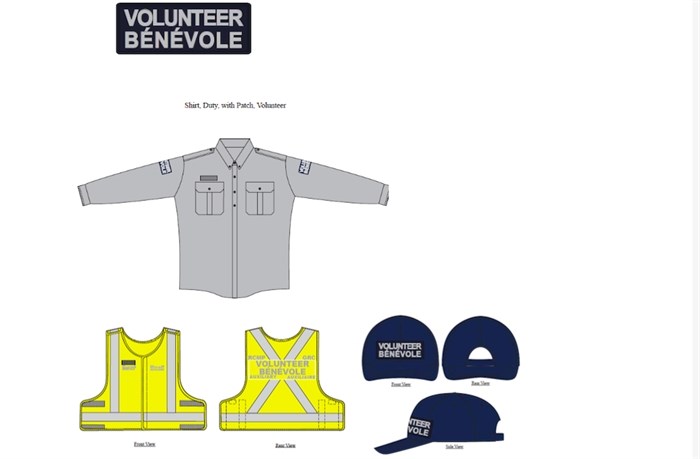
The new auxiliary police uniforms will replace the word auxiliary with volunteer and the hat with a baseball cap.
Image Credit: Flickr/British Columbia Emergency Photography
August 03, 2020 - 6:00 AM
The long-running battle between B.C. and the RCMP over its auxiliary police uniforms has ended with the RCMP being the clear winner and local detachments the losers.
The RCMP’s auxiliary program was launched in Canada in 1963. In January 2018 the RCMP announced a revamped, three-tier approach to the program but B.C. refused to go along because, in part, it didn’t like having the word “Volunteer” written in large letters on the back of the uniforms.
That campaign was championed by Kamloops city councillor Arjun Singh when he sat as president of the Union of B.C. Municipalities.
"The uniform kind of looks like one of those movies, like a pretend cop kind of thing who’s wearing a golf shirt,” Singh said. “The whole uniform is problematic.”
READ MORE: Fighting to get auxiliary police onto city streets is an uphill battle, says the man leading the charge in B.C.
Despite the best efforts of Singh, the provincial government and the Union of B.C. Municipalities, the RCMP have not budged on the uniform issue and has asked the province what it plans to do.
That led to the Ministry of Public Safety and Solicitor General to send letters to all B.C. municipalities asking if they are willing to support a move to the new three-tiered system on an interim basis while the province looked at ways to create its own program. That is supported by the Union of B.C. Municipalities.
The deadline for replying was July 15 but, since some cities have asked for more time, the ministry is not releasing information on how many or which ones have signed on. iNFOnews.ca has learned that Kelowna and Peachland are examples of municipalities that are supporting the program.

These are drawings of the proposed new RCMP auxiliary police uniforms.
Image Credit: Submitted/Ministry of Public Safety and Solicitor General
The RCMP and ministry did not provide details of how many auxiliary officers there were in B.C. but the numbers have declined dramatically in recent years.
A report to Kelowna city council in the fall of 2018, for example, said there were once 65 auxiliaries in Kelowna providing 11,000 hours of service. An RCMP crime update in March of this year said that had dwindled to 2,067 hours.
Kelowna officers worked those hours “to assist with Drug Abuse Resistance Education (DARE) presentations in schools, urban patrols, traffic control and community events,” that report stated.
It appears that the auxiliary program has ended in some communities but neither the Ministry nor the provincial RCMP had any details on where it is still operating. RCMP in Kelowna said that program is running but on a reduced level because of COVID-19.
The interim program has been proposed because it's expected to take a couple of years to get a designed-in-B.C. program up and running.
Even if the new program goes ahead on an interim basis, it will still take many months to put it in place.
For one thing, the letter going to municipalities says that the training for the new program will take four to six months for most members to complete. But it could be much longer.
“There will be delays in training due to COVID-19 since some of the training is in-person so will have to wait until the training can be held,” the email from the ministry states. “At this point we cannot speculate as to when the interim program, if it goes ahead, could be fully operational.”
It will cost up to $1,500 for each recruit, but that will be borne by the province. That includes $700 for the uniform. The rest of the cost will be for medical tests and training.
Recruits will get firearms familiarization training but will not be armed, the ministry said.
While there are three tiers to the new RCMP program, B.C. cities are being asked to support Tier 3, which is the most highly trained level.
The basic, Tier 1 officers are limited to Neighbourhood Watch programs, public education initiatives, non-enforcement support to operations, community fundraising events and participation in parades and public ceremonies.
To that, foot and bicycle patrols, access and traffic control and disaster assistance are added at Tier 2.
It’s only by going to Tier 3 that general duty patrols, attending calls, check stops, scene security and searches can be done by auxiliary officers.
To contact a reporter for this story, email Rob Munro or call 250-808-0143 or email the editor. You can also submit photos, videos or news tips to the newsroom and be entered to win a monthly prize draw.
We welcome your comments and opinions on our stories but play nice. We won't censor or delete comments unless they contain off-topic statements or links, unnecessary vulgarity, false facts, spam or obviously fake profiles. If you have any concerns about what you see in comments, email the editor in the link above.
News from © iNFOnews, 2020